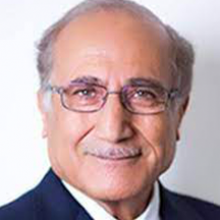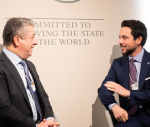You are here
The game of blood
Mar 18,2019 - Last updated at Mar 18,2019
In his address to the European Parliament on March 10, 2015, His Majesty King Abdullah asserted that “Our world faces on assault by terrorists with ruthless ambition. The motive is not faith, it is power; power pursued by ripping countries and communities apart in sectarian conflicts, and inflicting suffering across the world”.
The global description of the transmission mechanism of terrorism is most eloquent of what we have seen in Christchurch. Amman, the city of brotherly love as it is the original Philadelphia, has issued a message calling for interfaith coexistence and tolerance. The massacre committed in cold blood and premeditation against two mosques in a city called Christchurch stands in full contrast to the brotherly message of these institutions.
As soon as the news broke out, and the perpetrator’s online killing spree came to the attention of the authorities in New Zealand, the massacre had become all over the world’s screens and channels. Fifty people were butchered by this belated Custer, or three human beings of the Islamic faith were killed during every minute the killer had in order to commit his heinous crime.
A story told by the Nobel Prize winner economist Amartya Sen in his book, “The Argumentative Indian: Writings on Indian History, Culture and Identity”, summarises this human degenerative behaviour. In 1947, when India was divided into predominantly Hindu country and a new country of Muslim majority called Pakistan, many people on both sides, but mostly Muslims, were killed.
In his state, Bengal, a mob chased a man who came to the Sen’s residence begging for protection. By the time the guards took permission to let the man in, the mob had caught up with the escapee and axe-killed him. Amartya, who was nine, watched his indignant father asking the mob “why did you kill him?” The answer came “he is a Muslim”.
Amartya wondered why they identified the poor man as “Muslim”. He was also a Bengali, an Indian and a human being. But none of those broader identities would have warranted his murder. Thus, they narrowed his identity to the one where they can kill him.
HRH Prince Hassan always calls for the “larger and umbrella identity”, where people can be endowed with other sub-identities, but at no point should the sub-identity supersede the larger one. That is where our humanity, laws and basic rights are applied without any discrimination.
Islamophobia is probably considered by psychologists as a specific phobia and on which few field or analytical research papers have been published. But from now on, it shall be a haunting that will inhabit the dreams of the philosophers and thinkers.
Muslims are coming to the point where they will create their own versions of Dracula, vampires, Dr Frankenstein and even cap and abaya-attired superheroes.













